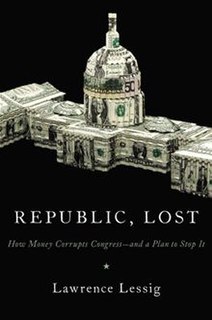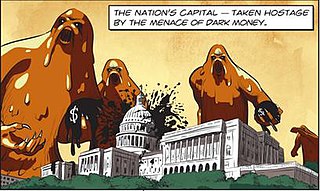Campaign finance laws in the United States have been a contentious political issue since the early days of the union. The Bipartisan Campaign Reform Act (BCRA) of 2002, also known as "McCain-Feingold", is the most recent major federal law affecting campaign finance, the key provisions of which prohibited unregulated contributions to national political parties and limited the use of corporate and union money to fund ads discussing political issues within 60 days of a general election or 30 days of a primary election, until BCRA's provisions limiting corporate and union expenditures for issue advertising were overturned in Federal Election Commission v. Wisconsin Right to Life.

Lester Lawrence Lessig III is an American academic, attorney, and political activist. He is the Roy L. Furman Professor of Law at Harvard Law School and the former director of the Edmond J. Safra Center for Ethics at Harvard University. Lessig was a candidate for the Democratic Party's nomination for president of the United States in the 2016 U.S. presidential election but withdrew before the primaries.
In the United States, a political action committee (PAC) is a 527 organization that pools campaign contributions from members and donates those funds to campaigns for or against candidates, ballot initiatives, or legislation. The legal term PAC has been created in pursuit of campaign finance reform in the United States. This term is quite specific to all activities of campaign finance in the United States. Democracies of other countries use different terms for the units of campaign spending or spending on political competition. At the U.S. federal level, an organization becomes a PAC when it receives or spends more than $1,000 for the purpose of influencing a federal election, and registers with the Federal Election Commission (FEC), according to the Federal Election Campaign Act as amended by the Bipartisan Campaign Reform Act of 2002. At the state level, an organization becomes a PAC according to the state's election laws.
A 527 organization or 527 group is a type of U.S. tax-exempt organization organized under Section 527 of the U.S. Internal Revenue Code. A 527 group is created primarily to influence the selection, nomination, election, appointment or defeat of candidates to federal, state or local public office.
Matching funds are funds that are set to be paid in proportion to funds available from other sources. Matching fund payments usually arise in situations of charity or public good. The terms cost sharing, in-kind, and matching can be used interchangeably but refer to different types of donations.
Campaign finance in the United States is the financing of electoral campaigns at the federal, state, and local levels. At the federal level, campaign finance law is enacted by Congress and enforced by the Federal Election Commission (FEC), an independent federal agency. Although most campaign spending is privately financed, public financing is available for qualifying candidates for President of the United States during both the primaries and the general election. Eligibility requirements must be fulfilled to qualify for a government subsidy, and those that do accept government funding are usually subject to spending limits on money.
Electoral reform in the United States refers to efforts to change American elections and the electoral system used in the United States.

Change Congress was a project aiming to end corruption in the United States Congress by reducing what it considered the distorted influence of money in that legislative body. Founded in 2008 by Lawrence Lessig and Joe Trippi, Change Congress aimed to organize citizens to push candidates to make commitments on the following issues: take no money from lobbyists or PACs, vote to end earmarks, support publicly financed campaigns, and support reform to increase congressional transparency.
American Crossroads is a US Super PAC that raises funds from donors to advocate for certain candidates of the Republican Party. It has pioneered many of the new methods of fundraising opened up by the Supreme Court's ruling in Citizens United. Its president is Steven J. Law, a former United States Deputy Secretary of Labor for President George W. Bush and the Chairman of the Board of Directors is former Republican National Committee chairman Mike Duncan. Advisers to the group include Senior Advisor and former White House Deputy Chief of Staff Karl Rove and former Mississippi Governor Haley Barbour.

Republic, Lost: How Money Corrupts Congress—and a Plan to Stop It is the sixth book by Harvard law professor and free culture activist Lawrence Lessig. In a departure from the topics of his previous books, Republic, Lost outlines what Lessig considers to be the systemic corrupting influence of special-interest money on American politics, and only mentions copyright and other free culture topics briefly, as examples. He argued that the Congress in 2011 spent the first quarter debating debit-card fees while ignoring what he sees as more pressing issues, including health care reform or global warming or the deficit. Lessig has been described in The New York Times as an "original and dynamic legal scholar."
Arnold Hiatt is an American businessman who was the president of the Stride Rite footwear company. He was a large contributor to political campaigns for the Democratic Party as well as being a voice calling for money to get out of politics. He has called for serious electoral reform and public financing of elections. Hiatt was praised by Harvard Law School professor Lawrence Lessig for his stance on electoral reform.

In the politics of the United States, dark money refers to political spending by nonprofit organizations—for example, 501(c)(4) 501(c)(5) (unions) and 501(c)(6) groups—that are not required to disclose their donors. Such organizations can receive unlimited donations from corporations, individuals and unions. In this way, their donors can spend funds to influence elections, without voters knowing where the money came from. Dark money first entered politics with Buckley v. Valeo (1976) when the United States Supreme Court laid out Eight Magic Words that define the difference between electioneering and issue advocacy.

Moneyocracy is a 2012 documentary film about Citizens United v. Federal Election Commission, 558 U.S. 310 (2010),which was a landmark United States Supreme Court case in which the Court held that the First Amendment prohibited the government from restricting independent political expenditures by corporations and unions. The film explores how the Citizens United v. Federal Election Commission decision has dramatically changed the U.S Campaign Finance Laws and lead to the most expensive Elections in the United States. The film describes the systemic corruption of the United States democracy and the consequences of that systemic corruption on the U.S democracy and the electorate.
Jonathan Tivadar Soros is the founder and chief executive officer of JS Capital Management LLC, a private investment firm. Prior to that, Soros worked at Soros Fund Management in daily operations and was co-deputy chairman of the organization.
Issue One is an American nonpartisan, nonprofit organization that seeks to reduce the role of money in politics. It aims to increase public awareness of what it views as problems within the present campaign finance system, and to reduce the influence of money in politics through enactment of campaign finance reform.
Every Voice is an American nonprofit, progressive liberal political advocacy organization. The organization was formed in 2014 upon the merger of the Public Campaign Action Fund, a 501(c)(4) group, and the Friends of Democracy. Every Voice, along with its affiliated Super PAC, Every Voice Action, advocates for campaign finance reform in the United States via public financing of political campaigns and limitations on political donations. The organization's president, David Donnelly, has said "We fully embrace the irony of working through a Super PAC to fight the influence of Super PACs."

The 2016 presidential campaign of Lawrence Lessig, a law professor at Harvard University and cofounder of Creative Commons, was formally announced on September 6, 2015, as Lessig confirmed his intentions to run for the Democratic Party's nomination for President of the United States in 2016. Lessig had promised to run if his exploratory committee raised $1 million by Labor Day, which it accomplished one day early. He described his candidacy as a referendum on campaign finance reform and electoral reform legislation.

The Citizen Equality Act of 2017 is a draft piece of legislation proposed by former 2016 American presidential candidate Lawrence Lessig. The act was the centerpiece of Lessig's campaign platform, encompassing his plans for campaign finance reform, expansion of voting access, and revised districting laws. Lessig had stated that if elected, he would make these reforms the first priority of his presidency. At the start of his campaign, he announced his candidacy as a "referendum," stating that he would step down upon the enactment of the Citizen Equality Act and turn the presidency over to the vice president. In an October 2015 interview on HBO's Real Time with Bill Maher, he retracted this statement and expressed his intention to stay on as president if elected. On November 2, 2015, Lessig ended his bid for the presidency, citing changes in Democratic Party rules that excluded him from the stage during televised debates.
A campaign finance reform amendment refers to any proposed amendment to the United States Constitution to authorize greater restrictions on spending related to political speech, and to overturn Supreme Court rulings which have narrowed such laws under the First Amendment. Several amendments have been filed since Citizens United v. Federal Election Commission and the Occupy movement.
End Citizens United (ECU) is a political action committee in the United States. The organization is working to reverse the U.S. Supreme Court 2010 decision in Citizens United v. Federal Election Commission, which deregulated limits on independent expenditure group spending for or against specific candidates. It is focused on driving larger campaign donations out of politics with a goal to elect "campaign-finance reform champions" to Congress by contributing and raising money for these candidates as well as running independent expenditures. End Citizens United was founded in 2015, operating in its first election cycle during 2016 with more than $25 million in funding.







